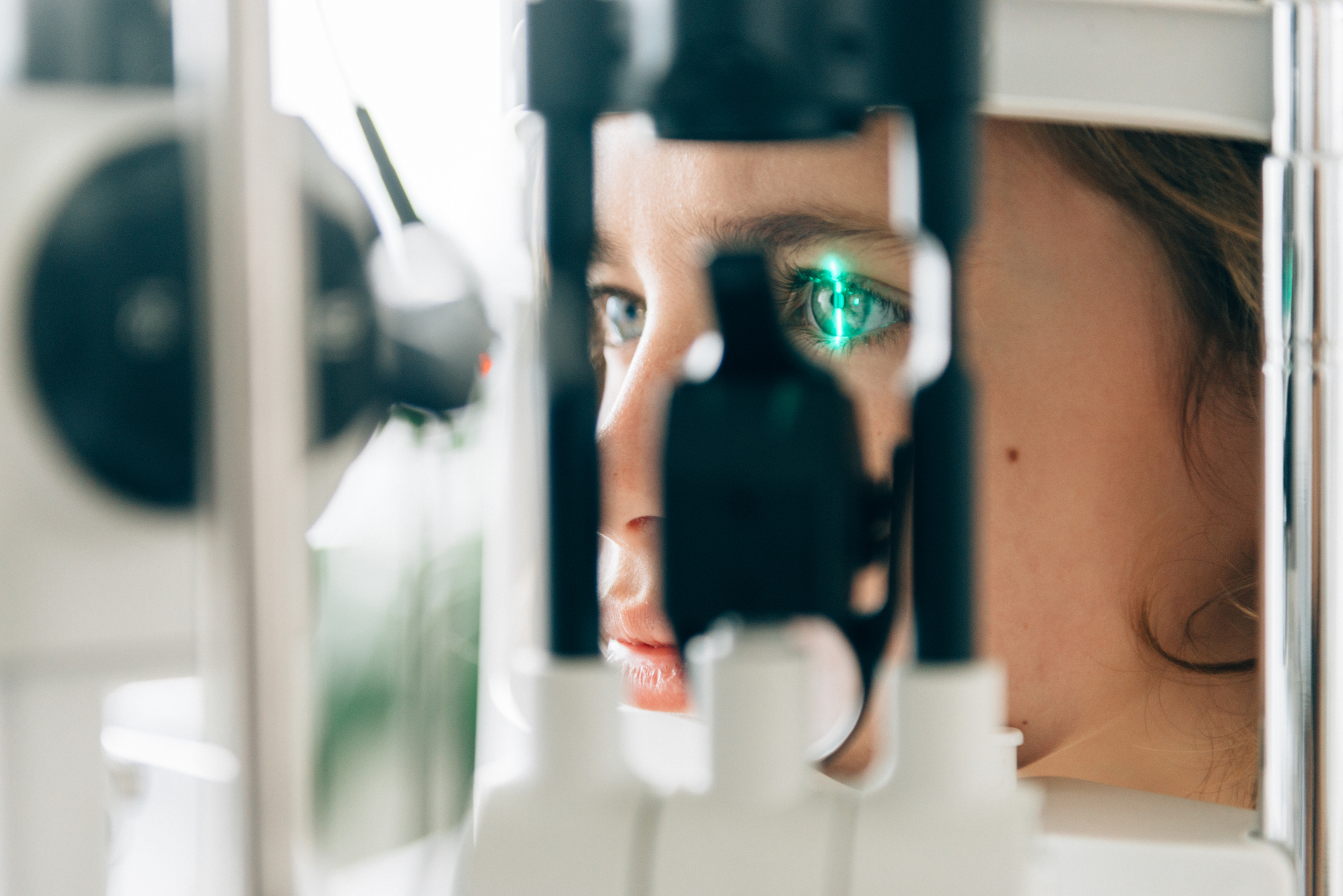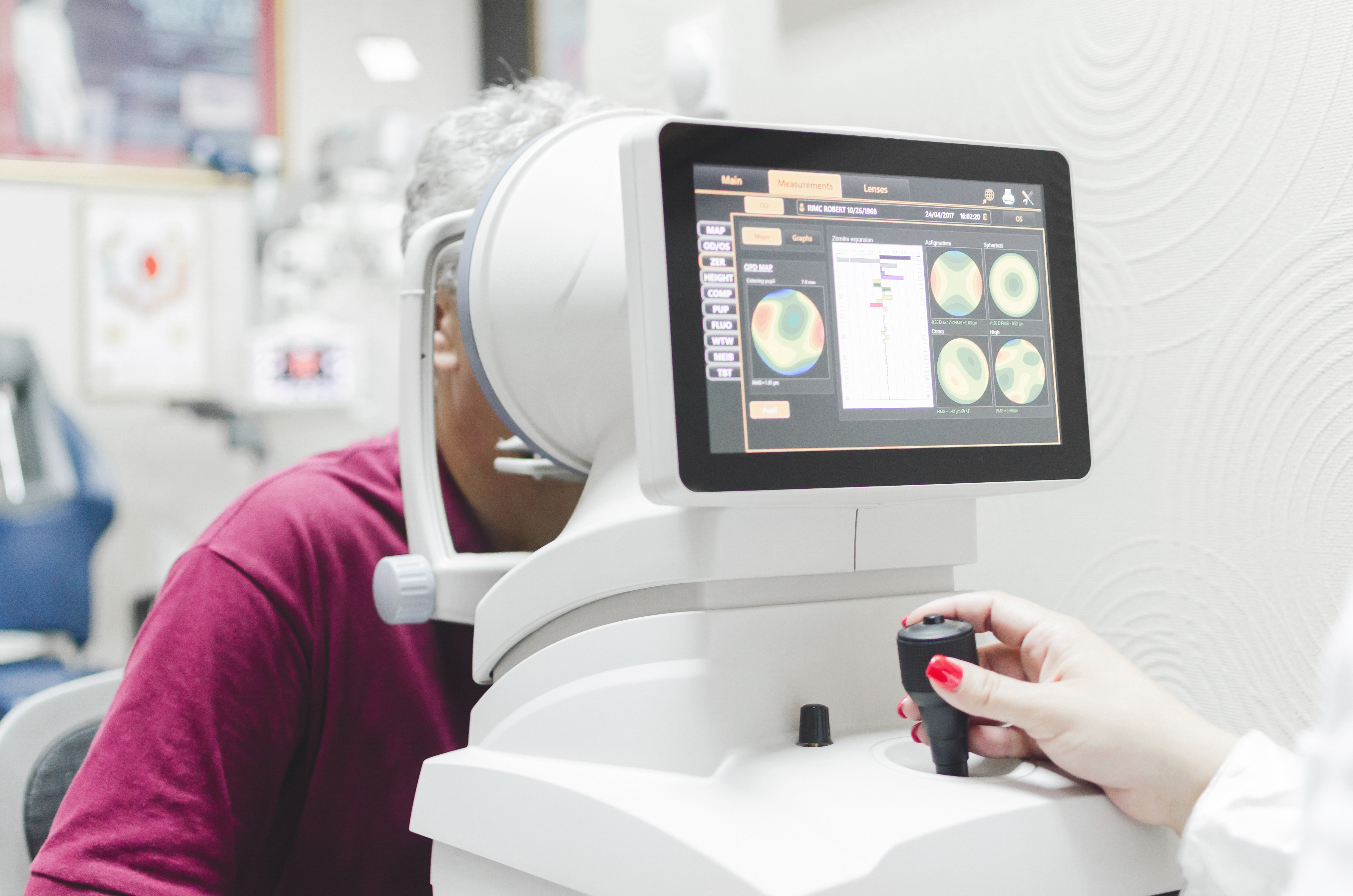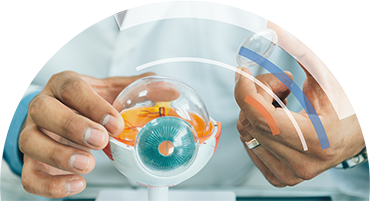Vision, the most valued sense
We depend on our vision for so many everyday activities - finding our way around our homes and outside, reading, driving or simply enjoying a beautiful view. That's why people often say vision is the sense they most value and most fear to lose.
So, it's lucky we live in a time where we can correct most vision problems, prevent many forms of sight loss and support people with permanent vision loss to live independently.
Learn more about
- Taking care of your eyes
- Having an eye examination
- Finding your local eye care provider
- Common eye problems and conditions
- Support for people with sight loss
- Learn more
The best way to look after your eyes is to have a regular eye examination as part of your general health care routine.
During your eye examination your vision, eye health and more will be assessed by a qualified eye care professional known as an optometrist. Most optometrists work with dispensing opticians in local opticians' practices across the UK.
In most cases, your local optician can provide you with all the support and care you need. Opticians in the UK also work with a wide range of other eye health professionals and your GP to ensure you get the right support and care.
Optometrists perform detailed eye examinations to detect defects in vision, ocular disease or other health issues. Many now also perform advanced diagnostic tests and co-manage patients with eye conditions. They form the single largest group of eye care professionals in the UK and most work in local optician practices across the UK.
Dispensing opticians can fit and supply spectacles to children and adults and can advise on and dispense low vision aids. With additional specialist training, they can also fit contact lenses and examine the anterior eye for defects and ocular disease. Most work in optician practices across the UK.
Orthoptists specialise in diagnosing and treating visual problems involving eye movements. They might have other roles and responsibilities. They typically work in hospital eye clinics but can also work in community settings - for example, when screening in schools.
Ophthalmologists are medically trained doctors who specialise in eye health. They often do a mix of surgical and non-surgical work, and as they build more experience they typically specialise in a specific sub-speciality, for example, some specialise in glaucoma and others in specialist types of eye surgery.
Other eye care professionals. Ophthalmic medical practitioners (OMPs) are doctors who specialise in eye care and typically work in primary care settings. Ophthalmic nurses often work in hospitals supporting ophthalmologists. You might also meet ophthalmic and vision scientists who perform specific types of diagnostic tests.

In the UK you benefit from readily accessible eye care experts based in community settings, making it easy to have your eye health and sight needs assessed closer to home. This care is accessible on the NHS or privately.
NHS support
If you live in Scotland the NHS will fund your eye examination. In other UK countries, NHS funded eye examinations are only available to certain groups.
The NHS might also provide you with some support towards the cost of spectacles or contact lenses depending on your individual circumstances.
If you are unable to visit your optician, you can arrange a home visit. The NHS will fund this service if you are unable to leave home unaided as a result of injury or physical or mental illness and eligible for NHS support - read Guide to sight tests at home.
The NHS also provides a wide range of other eye health services based on clinical need, including access to orthoptists and ophthalmology. You can access these services via a referral from your local optician or GP, and in the case of an emergency directly through local A&E departments.
If you live in England, read this guide on free NHS eye tests and optical vouchers.
If you live in Northern Ireland, read this guide on free Health Service eye tests and optical vouchers
If you live in Scotland, you are entitled to an NHS funded eye examination. Find out if you are entitled to a voucher towards the help of spectacles or contact lenses.
If you live in Wales, read NHS Direct Wales' FAQs on NHS eye tests and optical vouchers.Self-funded eye care
If you are not entitled to NHS support, you still benefit from patient choice when accessing private eye examinations, spectacles, contact lenses and more. The UK has a wide range of providers and affordable eye care is widely accessible.
Find your local eye care provider
In most cases your journey will begin with a routine eye exam at your local optician, where the optometrist will assess your eye health and if clinically indicated refer you to an ophthalmologist or other eye care specialist.
Prevention is better than cure, so don't wait until you have an eye problem before taking action as an early diagnosis of many common eye conditions can help prevent permanent sight loss; take action today and see your local eye care provider.
The best way to learn more is to contact your local optician today. Find your local optician below.
If you live in England, search for an optician
If you live in Northern Ireland, search for an optician
If you live in Scotland, search the opticians directory
If you live in Wales, search for an opticianIn cases of an emergency, it is still worth contacting your local optician first to see if they can help because many now also offer additional services for people who have an eye problem that needs urgent attention. If you cannot get advice from your optician or GP then you might need to attend A&E
- If you live in England, search for a local eye A&E
- If you live in Scotland, search for a local A&E which offers an eye care service
- If you reside in Wales, most local opticians will be able to offer you a free sight test if you have an eye problem that needs urgent attention
- If you live in Northern Ireland, the local Health Services search facility does not yet include a list of A&E departments that offer an eye care service, but most A&E departments will be able to help.
Common eye problems and conditions

Refractive error is the most common eye problem and results in blurred vision. Short-sightedness (myopia), long-sightedness (hyperopia) and astigmatism are all types of refractive error. Options for correcting refractive error include spectacles, contact lenses or refractive surgery.
Cataracts occur when the lens in our eye becomes less clear resulting in blurry vision. Cataracts in childhood are very rare compared to age-related cataracts. Where necessary surgery is a very effective and safe treatment for cataracts in most patients. Your local eye care experts will explain the risk and benefits of surgery so you can make an informed choice.
Macular degeneration is more common in people over the age of 50. It can affect central vision and make it more difficult to do everyday tasks. There are two main types of macular degeneration 'dry' and 'wet'. The wet form requires urgent medical attention in order to minimise the risk of severe vision loss, so it is important to seek urgent advice and support if you have symptoms of macular degeneration. If you have dry macular degeneration, your local optician can help you with ongoing advice and support.
Glaucoma results in damage to the optic nerve and can result in irreversible loss of vision if left untreated. In contrast, the early diagnosis and treatment of glaucoma can prevent sight loss. In most cases, in the early stages of glaucoma, people are not aware their vision is reducing. That is why it is important to have regular eye examinations. This is even more important if you are in a higher risk group, for example, if you have a family history of glaucoma or are of African, Caribbean or Asian origin.
Diabetic eye disease can result in vision loss, which is why it is important everybody with diabetes has regular eye screening appointments and manages their blood sugar levels, blood pressure and cholesterol.
To learn more about other common eye conditions visit the College of Optometrists' looking after your eyes website.
In most cases above, and with many other eye conditions, early diagnosis and the right support can help improve vision and eye health and prevent avoidable sight loss. That is why regular eye examinations are so important. See your optician for an eye health check.
Support for people who have sight loss
If you have sight loss you should still have regular eye examinations to check the health of your eyes and to ensure that your vision correction is optimised, so you get the best out of any assistive devices and technology.
There are also charities and support groups that can support you, such as:
- Royal National Institute of Blind People (RNIB)
- Royal Society for Blind Children (RSBC)
- Blind Veterans UK
- Diabetes UK
- International Glaucoma Association (IGA)
- SeeAbility
- Sense
Watch a range of videos from the College of Optometrists on how to use eye drops, on common eye problems, and more. The College also has a looking after your eyes website with a wide range of resources to help you better understand eye health and the benefits of taking action.
The Royal College of Ophthalmologists and RNIB also produce patient information booklets on a wide range of clinical topics.
About us
FODO is the association for eye care providers in the UK and our goal is to achieve better eye care for all. You can learn more about eye care in the UK by visiting our guide for policymakers and commissioners.

 Patients and public
Patients and public
 Policymakers
Policymakers Members
Members News and views
News and views

